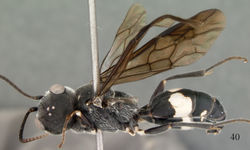Trigonalys natalensis
| Notice: | This page is derived from the original publication listed below, whose author(s) should always be credited. Further contributors may edit and improve the content of this page and, consequently, need to be credited as well (see page history). Any assessment of factual correctness requires a careful review of the original article as well as of subsequent contributions.
If you are uncertain whether your planned contribution is correct or not, we suggest that you use the associated discussion page instead of editing the page directly. This page should be cited as follows (rationale):
Citation formats to copy and paste
BibTeX: @article{Smith2012JournalofHymenopteraResearch24, RIS/ Endnote: TY - JOUR Wikipedia/ Citizendium: <ref name="Smith2012Journal of Hymenoptera Research24">{{Citation See also the citation download page at the journal. |
Ordo: Hymenoptera
Familia: Trigonalidae
Genus: Trigonalys
Name
Trigonalys natalensis (Kriechbaumer) – Wikispecies link – Pensoft Profile
- Trigonalis Natalensis Kriechbaumer, 1894:318.
- Trigonalys natalensis: Carmean and Kimsey 1998[1]: 70.
- Discenea natalensis madegassa Bischoff, 1933: 485.–Bischoff 1938[2]: 9.–Benoit 1951[3]: 141.–Paulian 1961[4]: 207.–Weinstein and Austin 1991[5]: 413.
Type material
Not examined. Kriechbaumer described this species from a female from “Port Natal 24.4.93”, now Durban, South Africa. The holotype of Discenea natalensis madegassa Bischoff is in MNHU “8 ♀♀ liegen vor von Madagaskar, Bekily, I., III, IV. 1932 und Ihosy, II.-III.1933 (Seyrig S.)” “Als Typus bezeichne ich ein Stück von Bekily, IV.1932.” Three paratypes are in MNHN.
Specimen examined
PROVINCE FIANARANTSOA: Parc National Ranomafana, Belle Vue at Talatakely, elev. 1020 m, 5–13 May 2002, 21°15.99'S, 47°25.21'E, coll. M. Irwin, R. Harin’Hala, California Acad. of Sciences, Malaise, secondary tropical forest, MA-02-09C-28 (1 ♂, CAS)
Description
Female (Fig. 40). Length, 10.0 mm. Black with clypeus, area below antennal sockets, lower inner orbits, malar area, genae, large spots on 2nd metasomal tergite, small lateral spots on 3rd metasomal tergite, and posterior part of 2nd metasomal sternite white. Wings evenly lightly infuscated.
Male
Not seen.
Distribution
Madagascar: Fianarantsoa, Toliara (type locality of Discenea natalensis madegassa). Angola, Kenya, South Africa, Zimbabwe (Carmean and Kimsey 1998[1]).
Host
Schultz (1910) stated that this was reared from an unidentified lepidopteran pupa.
Remarks
We have seen only one specimen and do not characterize this species further. It is readily separated from the Orthogonalys species by its black antennae, mostly black body, and infuscated wings. Two subspecies may occur in Madagascar, the typical subspecies from Madagascar, without locality, and Trigonalys natalensis madegassa from only the two localities given by Bischoff (1933)[6]. We see no reason to distinguish subspecies at present.
Taxon Treatment
- Smith, D; Tripotin, P; 2012: Trigonalidae (Hymenoptera) of Madagascar Journal of Hymenoptera Research, 24: 1-25. doi
Other References
- ↑ 1.0 1.1 Carmean D, Kimsey L (1998) Phylogenetic revision of the parasitoid wasp family Trigonalidae (Hymenoptera). Systematic Entomology 23 (1): 35-76. doi: 10.1046/j.1365-3113.1998.00042.x
- ↑ Bischoff H (1938) Trigonaloidae. In: Hedicke H (Ed) Hymenopterorum Catalogus, Pars 5. Dr. W. Junk, Gravenhage, 18 pp.
- ↑ Benoit P (1951) La systématique des Trigonaloidae (Hym.) éthiopiens. Revue de Zoologie et de Botanique Africaines 44 (2): 141-147.
- ↑ Paulian R (1961) La zoogéographie de Madagascar et des iles voisines. Faune de Madagascar 13, Publications de l’Institut de Recherche Scientifique Tananarive – Tsimbazaza, 484 pp.
- ↑ Weinstein P, Austin A (1991) The host relationships of trigonalid wasps (Hymenoptera: Trigonalyidae), with a review of their biology and catalogue to world species. Journal of Natural History 25 (2): 399-433. doi: 10.1080/00222939100770281
- ↑ Bischoff H (1933) Beiträge zur Kenntnis der Trigonaloiden. Mitteilungen aus dem Zoologischen Museum in Berlin 19: 480-496.
Images
|
